Hyundai i30 Wagon vs Vauxhall Grandland – Performance, range & efficiency compared
Two cars, one duel: Hyundai i30 Wagon meets Vauxhall Grandland.
Which one wins in performance, efficiency and value for money? Find out now!
Costs and Efficiency:
Looking at overall running costs, both models reveal some interesting differences in everyday economy.
Hyundai i30 Wagon has a clearly perceptible advantage in terms of price – it starts at 24800 £, while the Vauxhall Grandland costs 32600 £. That’s a price difference of around 7714 £.
Fuel consumption also shows a difference: Vauxhall Grandland manages with 2.60 L and is therefore convincingly more efficient than the Hyundai i30 Wagon with 5.70 L. The difference is about 3.10 L per 100 km.
Engine and Performance:
Under the bonnet, it becomes clear which model is tuned for sportiness and which one takes the lead when you hit the accelerator.
When it comes to engine power, the Vauxhall Grandland has a decisively edge – offering 325 HP compared to 140 HP. That’s roughly 185 HP more horsepower.
In acceleration from 0 to 100 km/h, the Vauxhall Grandland is decisively quicker – completing the sprint in 6.10 s, while the Hyundai i30 Wagon takes 9.80 s. That’s about 3.70 s faster.
In terms of top speed, the Vauxhall Grandland performs somewhat better – reaching 220 km/h, while the Hyundai i30 Wagon tops out at 197 km/h. The difference is around 23 km/h.
There’s also a difference in torque: Vauxhall Grandland pulls convincingly stronger with 509 Nm compared to 253 Nm. That’s about 256 Nm difference.
Space and Everyday Use:
Beyond pure performance, interior space and usability matter most in daily life. This is where you see which car is more practical and versatile.
Both vehicles offer seating for 5 people.
In curb weight, Hyundai i30 Wagon is distinct lighter – 1316 kg compared to 1675 kg. The difference is around 359 kg.
In terms of boot space, the Hyundai i30 Wagon offers minimal more room – 602 L compared to 550 L. That’s a difference of about 52 L.
In maximum load capacity, the Hyundai i30 Wagon performs hardly perceptible better – up to 1650 L, which is about 5 L more than the Vauxhall Grandland.
When it comes to payload, Vauxhall Grandland minimal takes the win – 568 kg compared to 524 kg. That’s a difference of about 44 kg.
Who comes out on top?
Overall, the Vauxhall Grandland shows itself to be is largely superior and secures the title of DriveDuel Champion.
It convinces with the more balanced overall package and proves to be the more versatile choice for everyday use.
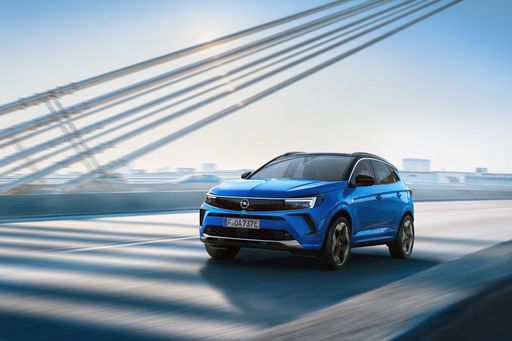
Vauxhall Grandland
Hyundai i30 Wagon
The Hyundai i30 Wagon offers a blend of practicality and style, making it a popular choice for families and those in need of extra space. Its sleek exterior and comfortable interior provide a pleasant driving experience, while advanced safety features ensure peace of mind on the road. The i30 Wagon stands out with its impressive fuel efficiency and reliability, catering to both urban and rural lifestyles.
details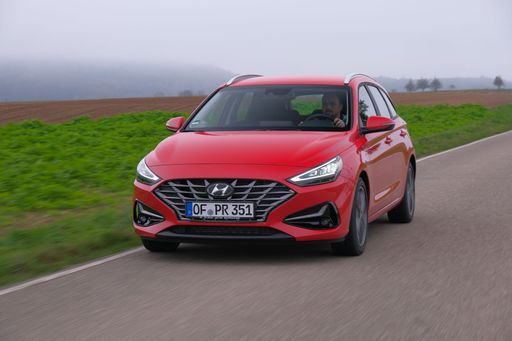 @ hyundai.news
@ hyundai.news
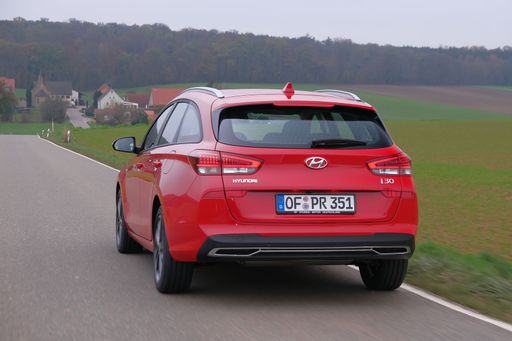 @ hyundai.news
@ hyundai.news
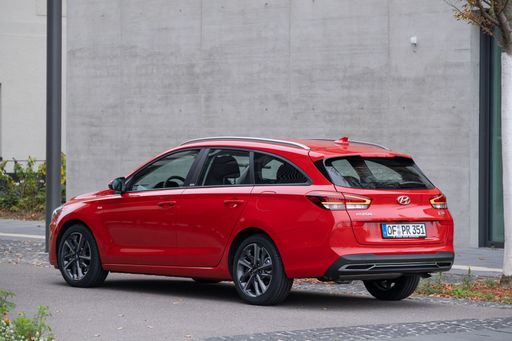 @ hyundai.news
@ hyundai.news
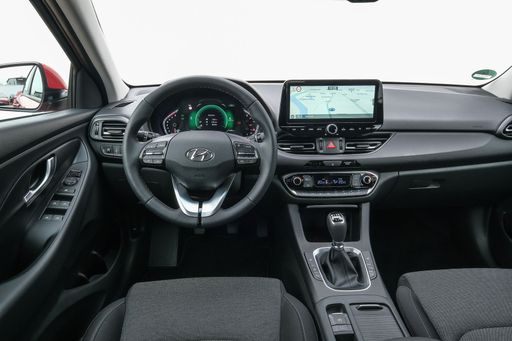 @ hyundai.news
@ hyundai.news
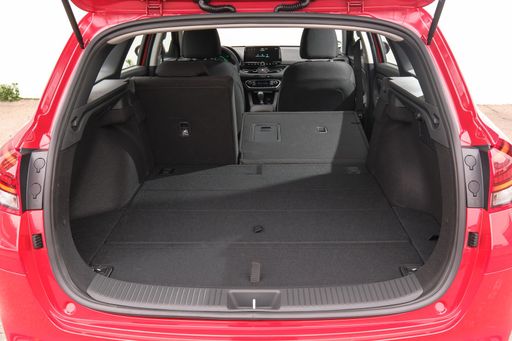 @ hyundai.news
@ hyundai.news
Vauxhall Grandland
The Opel Grandland offers a blend of style and practicality, making it an appealing choice for those seeking a versatile SUV. Its sleek design is complemented by a comfortable and spacious interior, providing an enjoyable driving experience for both short commutes and long journeys. Advanced technology and safety features enhance the overall appeal, ensuring drivers feel confident and connected on the road.
details @ media.stellantis.com
@ media.stellantis.com
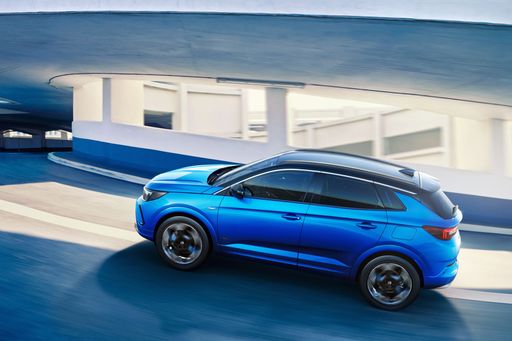 @ media.stellantis.com
@ media.stellantis.com
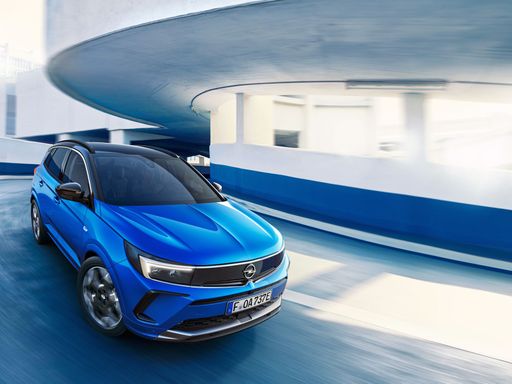 @ media.stellantis.com
@ media.stellantis.com
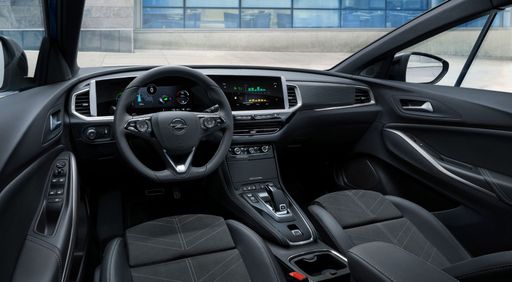 @ media.stellantis.com
@ media.stellantis.com

|

|
|
|
|
Costs and Consumption |
|
|---|---|
|
Price
24800 - 30100 £
|
Price
32600 - 51400 £
|
|
Consumption L/100km
5.7 - 6 L
|
Consumption L/100km
2.6 - 5.6 L
|
|
Consumption kWh/100km
-
|
Consumption kWh/100km
16.9 - 18 kWh
|
|
Electric Range
-
|
Electric Range
82 - 523 km
|
|
Battery Capacity
-
|
Battery Capacity
-
|
|
co2
130 - 136 g/km
|
co2
0 - 126 g/km
|
|
Fuel tank capacity
50 L
|
Fuel tank capacity
55 L
|
Dimensions and Body |
|
|---|---|
|
Body Type
Estate
|
Body Type
SUV
|
|
Seats
5
|
Seats
5
|
|
Doors
5
|
Doors
5
|
|
Curb weight
1316 - 1461 kg
|
Curb weight
1675 - 2325 kg
|
|
Trunk capacity
602 L
|
Trunk capacity
485 - 550 L
|
|
Length
4585 mm
|
Length
4650 mm
|
|
Width
1795 mm
|
Width
1905 - 1934 mm
|
|
Height
1475 mm
|
Height
1665 mm
|
|
Max trunk capacity
1650 L
|
Max trunk capacity
1580 - 1645 L
|
|
Payload
439 - 524 kg
|
Payload
425 - 568 kg
|
Engine and Performance |
|
|---|---|
|
Engine Type
Petrol, Petrol MHEV
|
Engine Type
Electric, Petrol MHEV, Plugin Hybrid
|
|
Transmission
Manuel, Automatic
|
Transmission
Automatic
|
|
Transmission Detail
Manual Gearbox, Dual-Clutch Automatic
|
Transmission Detail
Dual-Clutch Automatic, Reduction Gearbox
|
|
Drive Type
Front-Wheel Drive
|
Drive Type
Front-Wheel Drive, All-Wheel Drive
|
|
Power HP
100 - 140 HP
|
Power HP
145 - 325 HP
|
|
Acceleration 0-100km/h
9.8 - 13.3 s
|
Acceleration 0-100km/h
6.1 - 10.2 s
|
|
Max Speed
178 - 197 km/h
|
Max Speed
170 - 220 km/h
|
|
Torque
172 - 253 Nm
|
Torque
230 - 509 Nm
|
|
Number of Cylinders
3 - 4
|
Number of Cylinders
3 - 4
|
|
Power kW
74 - 103 kW
|
Power kW
107 - 239 kW
|
|
Engine capacity
998 - 1482 cm3
|
Engine capacity
1199 - 1598 cm3
|
General |
|
|---|---|
|
Model Year
2024
|
Model Year
2024 - 2025
|
|
CO2 Efficiency Class
D, E
|
CO2 Efficiency Class
A, D, B
|
|
Brand
Hyundai
|
Brand
Vauxhall
|
What drivetrain options does the Hyundai i30 Wagon have?
Available configurations include Front-Wheel Drive.
The prices and data displayed are estimates based on German list prices and may vary by country. This information is not legally binding.
